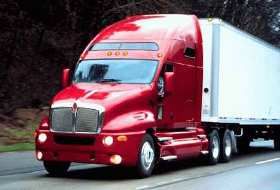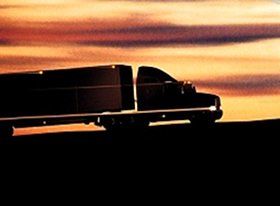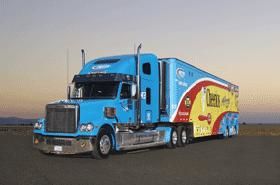C R England.....Yes Or No?
Topic 5668 | Page 1

Never did England... but from what I know they push their leasing program really really hard. You do not want to lease right out of school. There are other options for companies that will train you. Check out the company sponsored CDL schook section of this site. That can direct you to different options if you pick. Other than that welcome to the site!
CDL:
Commercial Driver's License (CDL)
A CDL is required to drive any of the following vehicles:
- Any combination of vehicles with a gross combined weight rating (GCWR) of 26,001 or more pounds, providing the gross vehicle weight rating (GVWR) of the vehicle being towed is in excess of 10,000 pounds.
- Any single vehicle with a GVWR of 26,001 or more pounds, or any such vehicle towing another not in excess of 10,000 pounds.
- Any vehicle, regardless of size, designed to transport 16 or more persons, including the driver.
- Any vehicle required by federal regulations to be placarded while transporting hazardous materials.

Thanks. I've heard that they push you to lease and I'm not interested in that to start a new career. I've been looking into different schools in my area and they all want their money up front which is understandable, but since I'm unemployed at the moment funds are low.

Welcome to Trucking Truth, Christina!





I would study as much of the High Road Training Program as humanly possible before going to their program. You will be so much better prepared than your peers. 17 days sounds intense but intense can be a good thing. I would be prepared to be fully immersed in their program if it's that quick. I would make sure that everyone close to me, family, spouse, etc. knew that I wasn't going to be very "available" to them during that time, too. I'd be saying things like, "You know I love you, but this will be hard core and during that time, I won't be 'there' for you like I usually am. I'll need your support while I get through this and then it'll be over."
I don't know a whole lot about C.R. England but you can look them up on this link Trucking Companies. From what I do know, they seem like a solid company and were I to go OTR , I would seriously consider them, myself.
Just remember, while you're there, you are being evaluated and observed the whole time, all the time. They will be watching everything you say and do, so remain professional, positive, and flexible at all times. They'll push your buttons, change plans, test you on stuff unexpectedly, just to see how you handle the stress. Steady-as-she-goes and remain calm, even when you make mistakes. Learn from them and take it all in stride. They're not always looking to see if you get it right but also how you handle yourself when you don't. At the very least, this will be a 17-day interview/evaluation period to see if you are fit for the company as well as capable of passing the CDL exam. One day, you might be totally down on yourself, wondering what you just got yourself into and the next day, you'll be confident and walking on a cushion of air. It will feel like you're sprinting the whole time so be extremely disciplined about your sleep schedule and make sure you get enough rest, every single night. Wake up every day fresh and ready to tackle it all over again. If you had a bad day, get lots of rest and don't let it carry over to the next day. Move on quickly. If you need to complain or vent - do it here, not at work. If you need advice or support, log-on here and start asking questions.
I wish you the best of luck. Remember: we got your back and know that we'll all be rooting for you! I'm sure you'll do great!
-mountain girl
CDL:
Commercial Driver's License (CDL)
A CDL is required to drive any of the following vehicles:
- Any combination of vehicles with a gross combined weight rating (GCWR) of 26,001 or more pounds, providing the gross vehicle weight rating (GVWR) of the vehicle being towed is in excess of 10,000 pounds.
- Any single vehicle with a GVWR of 26,001 or more pounds, or any such vehicle towing another not in excess of 10,000 pounds.
- Any vehicle, regardless of size, designed to transport 16 or more persons, including the driver.
- Any vehicle required by federal regulations to be placarded while transporting hazardous materials.
OTR:
Over The Road
OTR driving normally means you'll be hauling freight to various customers throughout your company's hauling region. It often entails being gone from home for two to three weeks at a time.

Never did England...
-Max
Ma-ax! How've you been, Dude!?



How are the oil fields of Pennsylvania?!
-mountain girl

Thank you so much Mountain Girl! Once I made the decision to do this I've tried to get and study every piece of information I can get my hands on. I'm just worried that they are going to shove so much stuff down my throat that I'll choke. My biggest problem right now is air brakes. Holy crap I get so confused! I've been passing the practice tests with most being 100%, but not air brakes. They will be the death of me!

Nah. You'll be fine. Just go over those lessons till you get it. So, you know when you have a parking brake on a car, you pull the brake up to set it, right? In the truck, you pull those valves out to set them, just like the car brake goes up. In a car, you push the button in with your thumb and then lower it to release it. In a truck, you push those valves in on the dash (more like, you punch them) to release them. Same thing. Up or out is when the brake is set, down or in is when it's not in use or not set.
You know when you drive by a tractor trailer on the highway and they have those curly-cue cords running from the tractor to the trailer? One is red, one is blue, and the third is green. They're just hanging there, swinging around, mid-air from tractor to trailer, right? Well, the red and the blue lines are supplying that air they're talking about, to the brakes on the trailer. The green one is for electrical power. The wheels on the trailer(s) have brakes of their own and those lines from the tractor are what supply them with power. That power is pressure from air. The red line is the emergency supply of air and the blue one is the supply of air that's used when you put your foot on the brake. The red one will work when you put your foot on the brake if the blue one fails. This will be easier once you're in a truck too. In your car, you just depress the brake pedal with your foot and it works. These tractor trailers that use air for the brakes and have to build up that air pressure for a couple of minutes before you can drive off with it safely. So you turn on the tractor and watch the two gauges rise to optimum pressure which will be from 120-140 pounds per square inch (PSI). Once they get to that point, the governor stops blowing more and more pressure. Otherwise, they would keep on pumping air into them and eventually something would pop, like a balloon. This is called "cutting out." Then the engine just maintains that pressure between 120 and 140 psi without going over. When you depress the brakes, you use up some of that pressure and the engine will re-build that pressure between each time you use the brake. You may have passed a tractor-trailer on the freeway and heard that "tshursh" hissing sound. (I love that sound. It's one of my favorite truck noises, ever) That's the governor "cutting out" or stopping its building of the pressure to 120-140 psi. You'll hear it when you do the brake test and then you know the governor has cut out and the pressure will stop building more and more and just stay at 120 to 140psi.
What else can I think of that describes the brakes in girl language? .... When you're doing the brake check portion of your pre-trip inspection , what you're checking, before driving, is whether or not these air-powered brakes will hold that required pressure when you use the brakes and will build that pressure back up, quickly enough between brake uses. So, you check the air pressure's "holding power" by holding the brake pedal down with your foot for a full minute. You watch the gauge to make sure that no more than 3psi is lost in with a single tractor or 4 psi for a tractor-trailer (4 axels - 4psi). You're also testing to see if the expected safety features will work, when/if the brakes lose too much pressure. So, you pump the brakes over and over ("fanning them off") with the engine turned off, until the pressure gets to where it would be considered dangerously low - 60 psi. At this point, if you were actually driving the truck while this happened, you'd have to press harder and harder to make the brakes work because the air pressure got lower and lower, right? So just before the pressure gets down to 60 psi, an alarm goes off. You're testing to see if that actually happens. The alarm goes off & sounds like eeeeeeee! Good, that works, then you keep on fanning the brakes by depressing them over and over till the pressure gets between 25-40 psi (I might not be exactly correct on those numbers) and your 2 valves pop back out (your emergency brake and your tractor protection valve) Remember I said it's just like pulling that parking brake up, in the car to set it?) Well, these pop up automatically, when the pressure is that low. This means that now that the brakes have gotten to failure level, the truck is setting them for you, pulling you to a stop (hopefully) since the foot brake isn't going to work any more. This is how you're testing all these processes, before you even leave the yard, to make sure they work rather than finding out that they don't, in a real emergency. Of course, the idea is that these mechanisms will never have to be used but at least when the pressure gets down to 60psi and the alarm goes off, you have a little time to pull over somewhere before the brakes automatically set (pop out) at 25-40psi.
Now that you've drained all the air pressure out during this test, you want to allow that pressure to build back up again before you drive off, so you turn the engine back on and watch the pressure gauges build back up. Once the pressure gets to 85psi, you check your watch to make sure it takes 45 seconds or fewer, for the pressure to reach 100psi - the min safe level - you're also checking that the pressure builds quickly enough so that when you do use your brakes, the pressure goes back up quickly between brake uses while you're driving.
Hopefully, I've given you a little foundation from which you can build your knowledge base.
-mountain girl
Pre-trip Inspection:
A pre-trip inspection is a thorough inspection of the truck completed before driving for the first time each day.
Federal and state laws require that drivers inspect their vehicles. Federal and state inspectors also may inspect your vehicles. If they judge a vehicle to be unsafe, they will put it “out of service” until it is repaired.
HOS:
Hours Of Service
HOS refers to the logbook hours of service regulations.OWI:
Operating While Intoxicated

Thanks. I've heard that they push you to lease and I'm not interested in that to start a new career. I've been looking into different schools in my area and they all want their money up front which is understandable, but since I'm unemployed at the moment funds are low.
Are you receiving unemployment benefits? In the state of Ohio that is one thing that will automatically qualify you for WIA funds. If you haven't already, I would check with your local unemployment office to see if you qualify regardless if you are getting benefits or not.

CR England training will be a lot easier since you are studying ahead of time for cdl permit. At the Texas school of theirs we had two whole days to study while there. Air brakes were the hardest part for me to visualize as well, you just got to go over the entire chapter a few times before it makes sense. If you got all the other sections down then you can use those days to focus on air brakes and ask the instructer questions.
The rest of the training is not bad. As long as you want to practice driving they will give you the plenty of chances. There will likely be a lot of guys that get lazy and do not really participate all that much when it is their turn to get in the truck, Your last few days of class will be in a truck with an instructor going over the entire test route several times till you get it down perfect, that was my experience at least.
I barely remember the company even mentioning leasing a truck. They took down a list of names of folks that raised their hands for it and that was it. They were pressing more for company team drivers which i recommend at least for a few months before going solo. Having another recent grad with me on the road helped out in a lot of tight situations i got myself into.
CDL:
Commercial Driver's License (CDL)
A CDL is required to drive any of the following vehicles:
- Any combination of vehicles with a gross combined weight rating (GCWR) of 26,001 or more pounds, providing the gross vehicle weight rating (GVWR) of the vehicle being towed is in excess of 10,000 pounds.
- Any single vehicle with a GVWR of 26,001 or more pounds, or any such vehicle towing another not in excess of 10,000 pounds.
- Any vehicle, regardless of size, designed to transport 16 or more persons, including the driver.
- Any vehicle required by federal regulations to be placarded while transporting hazardous materials.
HOS:
Hours Of Service
HOS refers to the logbook hours of service regulations.
Thank you all for the great info and feedback! My husband works on these trucks all day long and you'd think I'd retain some of his knowledge he gives me but I think I'm more of a hands on type of learner. I'm going over the chapter on air brakes over and over again. I'm sure when I physically get to see this stuff it'll click in my head. I can't wait to start this new career!!!!!!
New Reply:
New! Check out our help videos for a better understanding of our forum features

















Preview:








 TT On Facebook
TT On Facebook
I've wanted to get my CDL for years and now have the opportunity. I ran across C R England's driving school which they say is no money down and you get your CDL in 17 days(if you pass). I've heard from others that this is like going to boot camp and of course the recruiter isn't really going to be honest. Does anyone know much about their program? Any advice on what I should really study before starting?
CDL:
Commercial Driver's License (CDL)
A CDL is required to drive any of the following vehicles: